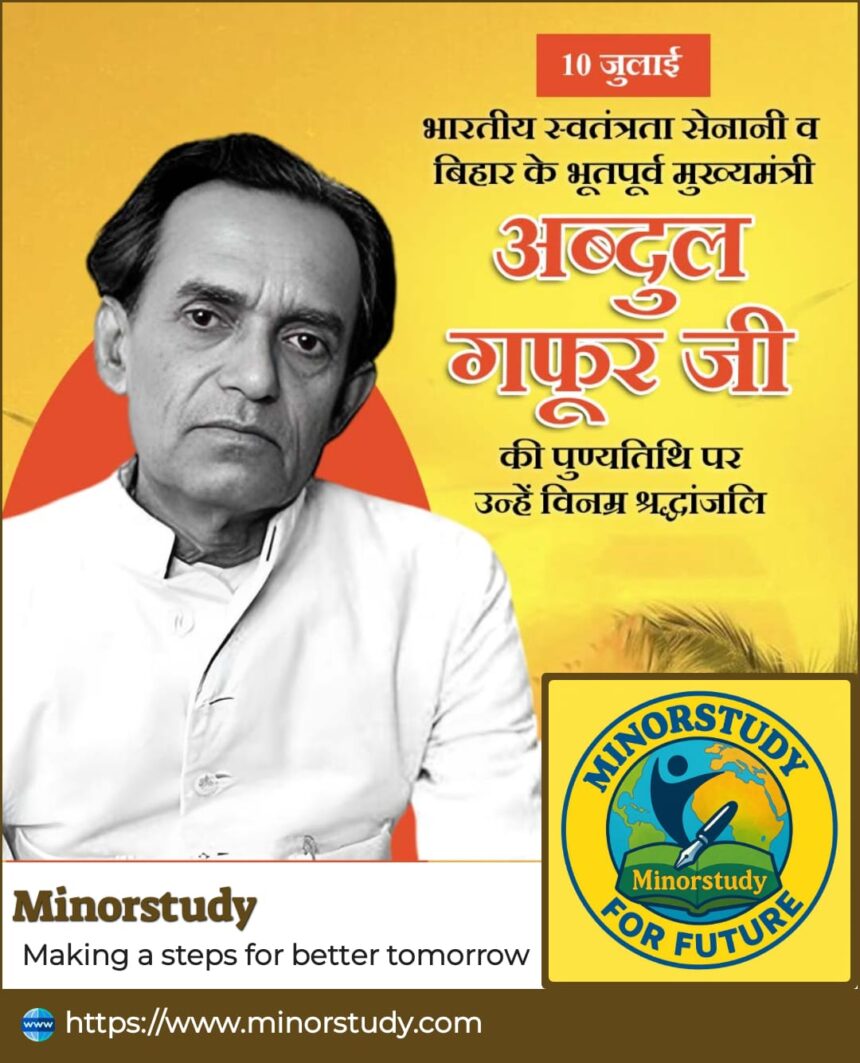🌟 Mr. Abdul Ghafoor Ji: The Visionary Leader Who Uplifted Bihar and Beyond – History, Impact & Human Legacy
Mr. Abdul Ghafoor Ji, a name synonymous with simplicity, dedication, and unwavering service, remains one of the most respected political leaders from Bihar. His humble origins, firm belief in secularism, and service-oriented political career reflect a timeless model of leadership rarely seen in today’s era. This detailed article will take you through his history, achievements, timeline, significance, life values, daily impacts, and why his legacy matters to society — written with a human-centered approach for every reader.
- 🕰️ History and Early Life of Abdul Ghafoor Ji
- 📊 9 Powerful Facts About Abdul Ghafoor Ji
- 📅 Timeline of Abdul Ghafoor Ji’s Life and Career
- 🎯 Political and Social Significance of Abdul Ghafoor Ji
- ❓ FAQs About Abdul Ghafoor Ji
- 🎉 Wishing in His Honor
- 💡 Importance in Our Life Today
- 🧠 Observance & Public Memory
- 📌 Important Points to Remember
- 🤝 Human Behaviour and Leadership Style
- 🏁 Conclusion – Daily Life Impact and Societal Relevance
- ✅ Final Thoughts
🕰️ History and Early Life of Abdul Ghafoor Ji
Born on May 5, 1918, in Sareya Akhteryar, Gopalganj district, Bihar, Mr. Abdul Ghafoor hailed from a humble yet culturally rich Muslim family. He completed his education at Aligarh Muslim University, one of India’s most prestigious institutions, which instilled in him a progressive worldview rooted in nationalism, secularism, and social justice.
He was deeply influenced by Mahatma Gandhi and the Indian freedom movement. Even before independence, he aligned himself with Congress ideals, participated in Quit India Movement, and worked for communal harmony during riots.
📊 9 Powerful Facts About Abdul Ghafoor Ji
Freedom Fighter: Played a pivotal role in the Indian independence movement, especially in the Quit India Movement of 1942.
Chief Minister of Bihar: Served as the 13th Chief Minister of Bihar from 1973 to 1975.
Minister in Union Cabinet: Held important portfolios under the Indira Gandhi government post-Emergency.
Aligarh Muslim University Alumni: A symbol of educational excellence among backward communities.
Secular Statesman: Always stood for Hindu-Muslim unity during volatile periods in Indian history.
Social Reformer: Advocated for education and empowerment of backward communities in Bihar.
Respected Parliamentarian: Elected multiple times to the Lok Sabha and Rajya Sabha.
Champion of Simplicity: Lived a simple life, disconnected from corruption or self-aggrandizement.
Abdul Ghafoor Hall, AMU: Honored posthumously with a hostel named after him at Aligarh Muslim University.
📅 Timeline of Abdul Ghafoor Ji’s Life and Career
| Year | Event |
|---|---|
| 1918 | Born in Sareya Akhteryar, Gopalganj, Bihar |
| 1942 | Active in Quit India Movement |
| 1952 | Elected to Bihar Legislative Assembly |
| 1973 | Became Chief Minister of Bihar |
| 1975 | Resigned during Emergency political shifts |
| 1980 | Elected to Lok Sabha from Siwan, Bihar |
| 1984 | Again elected to Lok Sabha |
| 1987 | Passed away on July 10, leaving behind a moral legacy |
🎯 Political and Social Significance of Abdul Ghafoor Ji
Abdul Ghafoor Ji was one of the few Indian leaders who successfully bridged the gap between grassroots politics and statesmanship. As Chief Minister of Bihar, he promoted land reforms, backward class welfare, and rural infrastructure development. His governance model emphasized ethical politics, development of weaker sections, and religious inclusiveness.
He also stood firm against communalism, making him a symbol of peace and national integration. Even during India’s darkest times—Emergency, post-Independence communal riots—he upheld constitutional values and justice.
❓ FAQs About Abdul Ghafoor Ji
Q1. What made Abdul Ghafoor Ji’s political career unique?
A: His career was marked by integrity, secularism, and pro-poor policies—traits rarely combined in Indian politics.
Q2. Did he serve in any central government positions?
A: Yes. After serving as Chief Minister, he was a Union Minister for Works and Housing under Indira Gandhi’s cabinet.
Q3. What was his biggest contribution to Bihar?
A: Promoting education, empowering the backward classes, and encouraging secular unity.
Q4. Is there any institution named after him?
A: Yes, Abdul Ghafoor Hall at AMU honors his contribution to education and politics.
Q5. How is his legacy remembered today?
A: Through tributes on his birth/death anniversaries, discussions in political and educational circles, and by communities inspired by his inclusive vision.
🎉 Wishing in His Honor
🕊️ “On this day, we fondly remember Abdul Ghafoor Ji — the symbol of hope, integrity, and inclusive politics. May his principles inspire our present and future generations to uphold justice, equality, and unity in all walks of life.” 🌹
💡 Importance in Our Life Today
In today’s fragmented socio-political environment, Abdul Ghafoor Ji’s model of value-driven leadership remains critically relevant. He reminds us that politics need not be a game of power—it can be a noble pursuit to uplift the common man, bridge communal divides, and bring educational empowerment to the masses.
For the youth, his journey from a modest village in Bihar to the corridors of Parliament shows that hard work, education, and ethical conduct still matter.
🧠 Observance & Public Memory
Annual Tributes: Political parties and communities observe his birth and death anniversaries with tributes.
Educational Discussions: Universities often reference his policies and personal ethics as case studies in political science.
Public Memorials: Roads and institutions in Bihar are named after him as a token of respect.
Social Welfare Drives: NGOs inspired by his life conduct education and health drives, especially in Bihar.
📌 Important Points to Remember
Born in 1918, Bihar – Passed away in 1987.
Former Chief Minister and Union Minister.
Known for secular, honest politics.
Supported marginalized and backward classes.
AMU alumnus – a figure of intellectual and moral strength.
Inspired generations with simplicity and sincerity.
🤝 Human Behaviour and Leadership Style
What truly sets Abdul Ghafoor Ji apart was not just his policy record—but his human-centric leadership. He never used religion or caste for political mileage. He practiced empathy, humility, and inclusivity—qualities often absent in modern leadership.
He believed every citizen deserves dignity, no matter their background. His speeches often reflected Gandhian philosophy—calling for non-violence, truth, and unity.
🏁 Conclusion – Daily Life Impact and Societal Relevance
Abdul Ghafoor Ji’s contributions live on in the form of values, not just policies. His push for education, clean politics, secularism, and community empowerment directly impacts:
Educational Access: His push for education has inspired many from backward communities to pursue learning.
Political Integrity: Even today, many politicians in Bihar cite him as a role model for ethical governance.
Social Harmony: His legacy is often invoked during interfaith dialogues and efforts for communal harmony.
Public Service Aspirants: His life motivates countless civil service aspirants to follow a people-first approach.
✅ Final Thoughts
Mr. Abdul Ghafoor Ji was more than a politician—he was a statesman, a freedom fighter, and a man of values. In a time when divisive narratives dominate politics, his inclusive, honest, and progressive ideology serves as a beacon of hope.
Let us remember, respect, and reflect on his journey—and ensure that his values don’t fade into history, but become pillars for our future.








